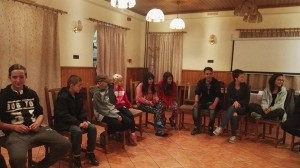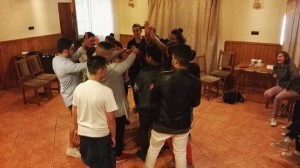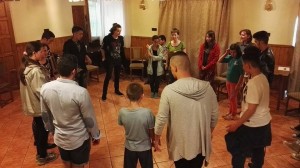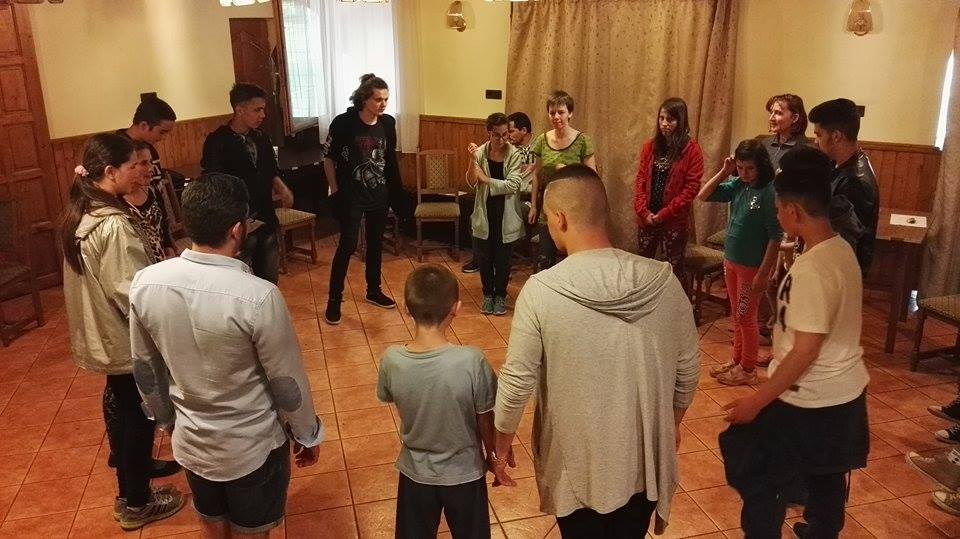In the Mashkar Kehilot project, on the 13th of May the group from Bátonyterenye organised their first action with their mentors’ help. We spent an entire day with Jewish youth from Budapest and Roma youth from Bátonyterenye and Lucfalva. The main goal was to question the prejudice towards Jews and the Roma. The action was supposed to be a small excursion, but due to bad weather, it was held in a conference room.

The first activity was to find out how much Roma and Jewish culture is part of the participants’ lives. We were also curious to find out their ways of being Jewish or Roma. The results were truly surprising: based on their answers, we realised that they barely identify with their culture itself, so we decided to guide the activity to a different direction: we played a role game where they created small plays about the sentence ‘I am Jewish/Roma’. All the plays were about prejudice and stigmatisation, so it was important to have a discussion on this topic. We discussed about the concept of prejudice and stigmatisation and they shared their own experiences as well.
These experiences showed that even though both Jews and the Roma are victims of our society’s stigmatisation, their effect are way different. Prejudice and stigmatisation against Jews does not result in discrimination, whereas prejudice and stigmatisation against the Roma does. We think that recognising these differences between Jews and the Roma is key and we need to have opportunities to share our experiences.

A Mashkar Kehilot projekt keretében május 13-án a bátonyterenyei mentorcsoporttal megrendeztük első akciónkat Bátonyterenyén. Egy egész napot töltöttünk együtt budapesti zsidó és bátonyterenyei, illetve Lucfalváról érkező roma és nem roma fiatalokkal. Az eseményen 8 éves kortól egészen 17 éves korig minden korosztály megjelent. Az akciónk elsődleges célja a romákkal és a zsidókkal kapcsolatos előítéletek megkérdőjelezése volt. Az eredeti terv szerint kirándultunk volna, de a rossz időjárás miatt egy kibérelt teremben tartottuk meg a foglalkozásainkat.
Az első foglalkozáson felmértük, hogy a résztvevőknek mennyire és milyen módon része a cigány, illetve a zsidó kultúra. Meglepő eredményeket kaptunk: a válaszaikból az derült ki, hogy kevéssé azonosulnak a zsidó és cigány kultúrával. Ez után kiscsoportokban drámajátékot játszottunk. A feladat az volt, hogy találjanak ki egy rövid jelenetet a következő mondat köré: „Cigány/zsidó vagyok”. A jelenetek mind megbélyegzésről és előítéletekről szóltak. Ennek kapcsán fontosnak tartottuk a beszélgetést ezekről a fogalmakról és a résztvevők személyes tapasztalatiról e témában.
 A személyes tapasztalatok viszont azt mutatják, hogy bár mindkét csoporttal szembe megbélyegző a társadalom, az előítéletek hatásai mégis különböznek. A zsidókkal szembeni előítéletek az esetek kis százalékában vonnak maguk után diszkriminációt, a romák esetében ez szinte automatikusan történik. Többek között az ilyen különbségek felismerése érdekében is fontos, hogy roma és zsidó csoportok közös tapasztalatmegosztó eseményeken vegyenek részt.
A személyes tapasztalatok viszont azt mutatják, hogy bár mindkét csoporttal szembe megbélyegző a társadalom, az előítéletek hatásai mégis különböznek. A zsidókkal szembeni előítéletek az esetek kis százalékában vonnak maguk után diszkriminációt, a romák esetében ez szinte automatikusan történik. Többek között az ilyen különbségek felismerése érdekében is fontos, hogy roma és zsidó csoportok közös tapasztalatmegosztó eseményeken vegyenek részt.


